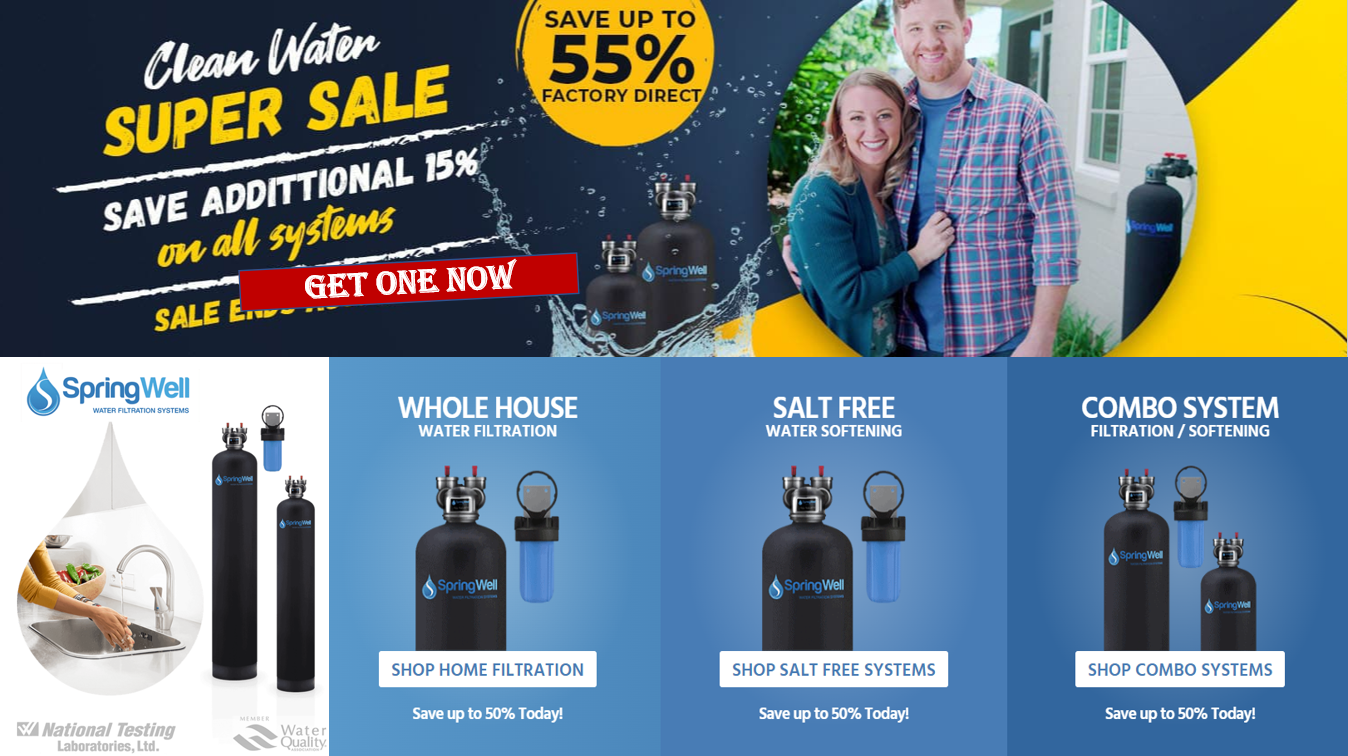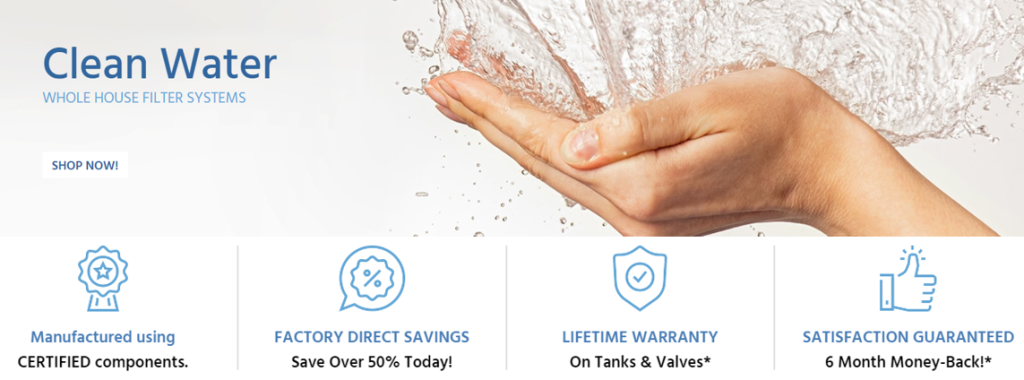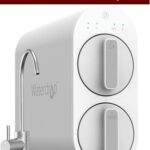Water softeners are used to remove magnesium, calcium, and other minerals from water.
Some people may not know that they need a water softener for well water, but for those who do, it can be a life-changing decision. Hard water contains high levels of minerals, including calcium and magnesium, which can cause a number of problems. A water softener removes these minerals from the water, making it safer and easier to use. For people with hard water, a water softener can make a big difference in their quality of life.
How Does A Water Softener Work?
A water softener works by exchanging ions in the water with ions on the resin beads in the softener.

A water softener is a machine that is used to remove hardness minerals from water. The process works by exchanging ions between the water and the softener’s resin beads. The beads are made up of sodium and chloride ions, which attract and bind to the hardness minerals in the water. This exchange process is what “softens” the water.
Install a Home Water Filter & Get "Unlimited Safe Drinking Water" For Decades
Get Upto 55% Discount With a Lifetime Warranty & 6-Months Money Back Guarantee Free Shipping
SpringWell Water Filtration Systems: 100% American-Made & NSF Certified Water Filters and Water Softeners
Let’s take a closer look at how this process works:
1. Hard water enters the water softener through a pipe and is then funneled into the resin tank.
2. The hard water flows past the resin beads, which are negatively charged. The beads attract and bind to the positively charged hardness minerals in the water.
3. As the hardness minerals become bound to the resin beads, the water becomes softer.
4. Once the resin beads are full of hardness minerals, they need to be “regenerated” or “recharged.” This is done by flushing the beads with a concentrated salt water solution.
5. The salt water flushes the hardness minerals off of the beads and back into the wastewater drain.
6. The regeneration process cleans the resin beads so they can start the ion exchange process all over again.
7. Soft water is then able to flow through the water softener and out to the rest of your home.
A water softener is a great way to improve the quality of your water. Not only will it make your water feel softer, but it will also help prolong the life of your plumbing and appliances.
If you’re interested in installing a water softener in your home, contact a local plumbing professional. They will be able to help you select the right unit for your home and install it properly.
How Does A Water Softener Remove Hardness From Water?
A water softener removes hardness from water by exchanging magnesium and calcium ions for sodium ions.
Water hardness is caused by dissolved calcium and magnesium in water. These minerals can form a hard scale on pipes and fixtures and cause major problems with your plumbing. A water softener removes hardness from water by exchanging the calcium and magnesium ions for sodium or potassium ions. This process is called ion exchange. The water softener unit has a resin bed that contains tiny beads. These beads are coated with sodium or potassium ions. As hard water passes through the resin bed, the calcium and magnesium ions are attracted to the beads and exchange places with the sodium or potassium ions. The calcium and magnesium ions are then flushed out of the system, leaving soft water behind.
How Does A Water Softener Prevent Hardness Buildup In Pipes And Appliances?
A water softener prevents hardness buildup in pipes and appliances by exchanging magnesium and calcium ions in the water for sodium ions.
Water softeners are devices that are used to remove hardness from water. Hard water contains high levels of dissolved minerals, such as calcium and magnesium. These minerals can cause a variety of problems, such as making it difficult to get soap to lather, leaving a film on dishes and shower doors, and making it difficult to clean clothes. A water softener removes these minerals from the water, preventing them from causing these problems.
Water softeners work by exchanging the hardness minerals for other minerals, such as sodium or potassium. This process is known as ion exchange. The water softener contains a bed of beads or resin. These beads are made of a material that is attracted to the hardness minerals. As the water flows through the beads, the minerals are attracted to the beads and are exchanged for the sodium or potassium.
The exchanged minerals are then flushed out of the water softener and down the drain. The water that remains is soft water that does not contain the hardness minerals. This water is then available for use in the home.
Water softeners are an effective way to prevent hardness buildup in pipes and appliances. They can also extend the life of these pipes and appliances by preventing the buildup of mineral deposits.
What Are The Benefits Of Using A Water Softener?
Some benefits of using a water softener are that it can extend the life of appliances that use water, improve the efficiency of soap and detergent, and prevent hard water buildup.
There are many benefits of using a water softener, including reducing hard water buildup in plumbing, making it easier to clean dishes and laundry, and extending the life of appliances that use water. Hard water contains high levels of minerals, like calcium and magnesium, which can cause a variety of problems in the home. Water softeners work by exchanging the minerals in hard water for sodium ions, which are then flushed out of the system. This process not only prevents hard water buildup, but also makes it easier to clean because soap and detergent can lather more easily in soft water. In addition, appliances that use water, such as dishwashers, washing machines, and water heaters, will last longer when they’re not constantly exposed to the corrosive effects of hard water.
If you’re considering a water softener for your home, there are a few things to keep in mind. First, you’ll need to decide which type of system is best for you. There are two basic types of water softeners: ion exchange and reverse osmosis. Ion exchange systems are the most common and most effective type of water softener. They work by exchanging the minerals in hard water for sodium ions, which are then flushed out of the system. Reverse osmosis systems work by filtering out the minerals in hard water, but they require more maintenance and can be less effective.
Second, you’ll need to decide how much water you need to soften. Water softeners are rated by the grains per gallon (GPG) of hardness they can remove. For most homes, a water softener with a capacity of 20 to 30 GPG will be sufficient.
Finally, you’ll need to choose a water softener that’s compatible with your home’s plumbing. Most water softeners will work with any type of plumbing, but some systems may require special adapters or fittings. Be sure to consult with a qualified plumber to make sure you get the right system for your home.
What Are The Disadvantages Of Using A Water Softener?
Water softeners can add a significant amount of sodium to water, which can be a problem for people on low-sodium diets.
If you’re considering using a water softener, there are a few things you should know about the disadvantages of this type of system.
Water softeners work by exchanging ions in the water. This process removes magnesium and calcium from the water, which are the minerals that cause hardness. While this can be an effective way to improve the quality of your water, there are a few potential drawbacks to using a water softener.
One of the biggest disadvantages of using a water softener is the cost. These systems can be quite expensive to install and maintain. Additionally, water softeners require a lot of salt to function, which can also add to the cost.
Another potential downside to using a water softener is that it can remove other minerals from your water that are actually beneficial to your health. This is why it’s important to consult with a water treatment expert before installing a water softener to make sure it’s the right decision for you.
Finally, water softeners can put a strain on your plumbing system. The exchange process can cause corrosion and scale build-up in your pipes. This can lead to clogged pipes and other plumbing problems.
If you’re considering using a water softener, weigh the pros and cons carefully to decide if it’s the right choice for you.
FAQ
How Much Does A Water Softener Cost?
How Often Does A Water Softener Need To Be Regenerated?
What Are The Maintenance Requirements For A Water Softener?
What Are The Consequences Of Not Using A Water Softener?
“Do you need a water softener for well water?”


